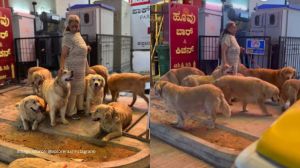Mother’s Day
Amother’s love is not reason enough to be one among the 1,000 women worldwide, who have been jointly nominated for the Nobel Peace P...

Amother’s love is not reason enough to be one among the 1,000 women worldwide, who have been jointly nominated for the Nobel Peace Prize 2005. But then, Neidonuo Angami is not your regular friendly neighbourhood mom.
Born in a state that has given birth to India’s oldest insurgency — Nagaland — Angami (56), among other things, is the founding member and first president of the feared and respected Naga Mothers’ Association (NMA).
Besides demanding that factionalism, insurgency and tribal rivalry don’t rob mothers of their sons, the NMA’s silent ‘Shed No More Tears’ campaign, led by the dynamic Angami, is credited with making different warring factions in Nagaland sit up and think of lasting peace.
Finally, the initiative of women was being noticed, especially the powerful NSCN (Isaac-Muivah), thanks to a woman who felt very strongly about empowering women. Due to the NMA’s efforts, the Naga peace process was underway and on strong ground.
BORN on October 1, 1950, in Kohima, just as the Naga insurgency was taking shape and flight, Angami had no inkling that she would go on to be honoured with the Padmashri for social service by the government of India in 2000. Or that she’d be nominated to share with 999 other women, what is regarded as the most prestigious among Nobel prizes — the Peace Prize.
‘‘During my youth, there was no state level body for Naga women. At that time Naga society was being torn apart by conflict-driven drug addiction and alcoholism. Since we had to fight social evils, I decided it would be appropriate to make it a mothers’ association; it’s the mothers who lose in the long run, anyway,’’ says Angami.
‘‘No one opposed us, but there were teething troubles of course,’’ she adds. In 1969-70, when the US put, for the first time, a man on the moon, Angami joined the first batch of Nagaland women police, as a sub-inspector. For her time and surroundings, it was about the same in importance.
In 1972, Angami left the police force and became a teacher at the Kohima English School (now Mezhur Higher Secondary School). She also doubled as the Girl Guides captain during her two-year stint. In 1975, her nine-to-five days were over, for good, as she jumped in headlong into social work. Her campaign to empower the women and youth of her state had just begun.
|
says Angami, ‘‘The nomination is a tribute to women, to all Nagas. The Naga peace talks are on, and the Naga Mothers’ Association is the bridge-builder, among our own people and the neighbouring states
|
Two years later, Angami co-founded Nagaland Weavers’ Association — an apex body of handloom and handicrafts. This organisation facilitated the participation of Nagaland State in many exhibitions in different parts of India and International Trade Fair, besides being instrumental in sending Naga craftsmen to Punjab, Karnataka, Jammu and Kashmir in late Seventies, for exposure and training. While being general secretary of the weavers’ body, Angami also held a similar post with the Chumukedima Plain Sector Angami Womens’ Organisation (Kuda Razha Angami Miapfu Krotho). In 1984, she co-founded the NMA, and became its first president.
‘‘I feel that my biggest achievement has been in spreading awareness among women in helping them root out drug abuse and alcoholism. It took time to reach the grassroot level. As we have many tribes in Nagaland, the tribal women’s organisations are our backbone.’’
‘‘Our work is still continuing, and drug addiction is still a serious problem. But intervention by organisations such as the NMA has seen a growth in recovery,’’ says Angami.
In her long career of social work Angami has also represented the NMA at various peace and HIV/AIDS related conferences, in India and abroad, and has been part of the Indo-Naga Peace Process consultation in Nagaland, New Delhi and Bangkok.
On her Nobel Peace Prize nomination Angami says, ‘‘It is a tribute to women, to all Nagas and I’m looking forward to being among the winners. The Naga peace talks are on, and NMA is the bridge-builder, among our own people and neighbouring states.’’






- 01
- 02
- 03
- 04
- 05

























